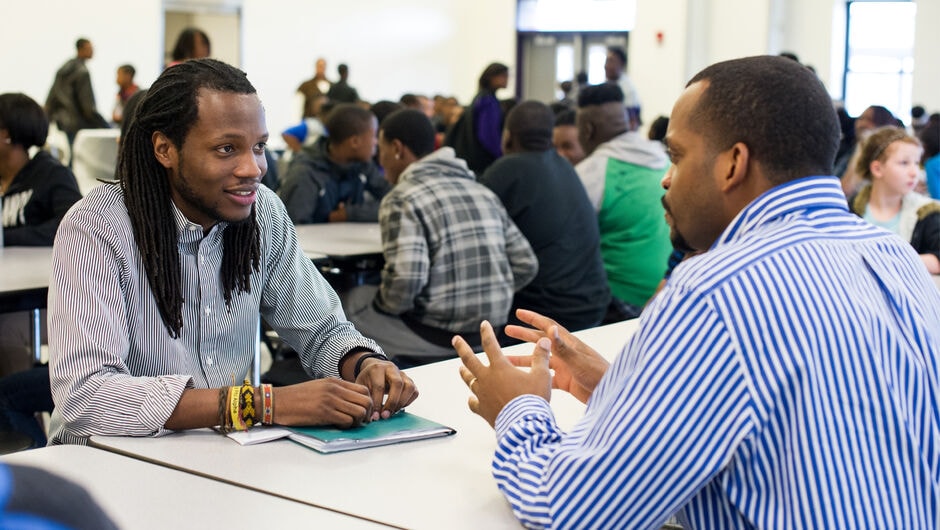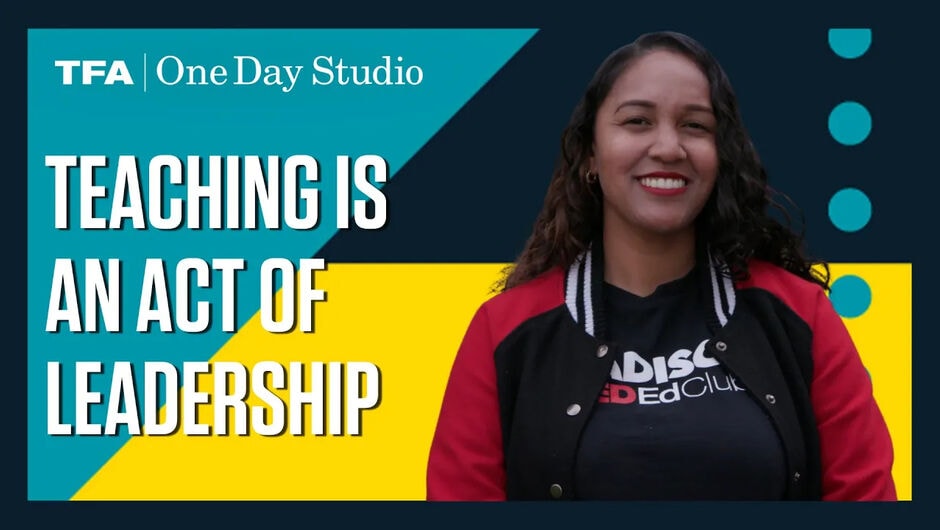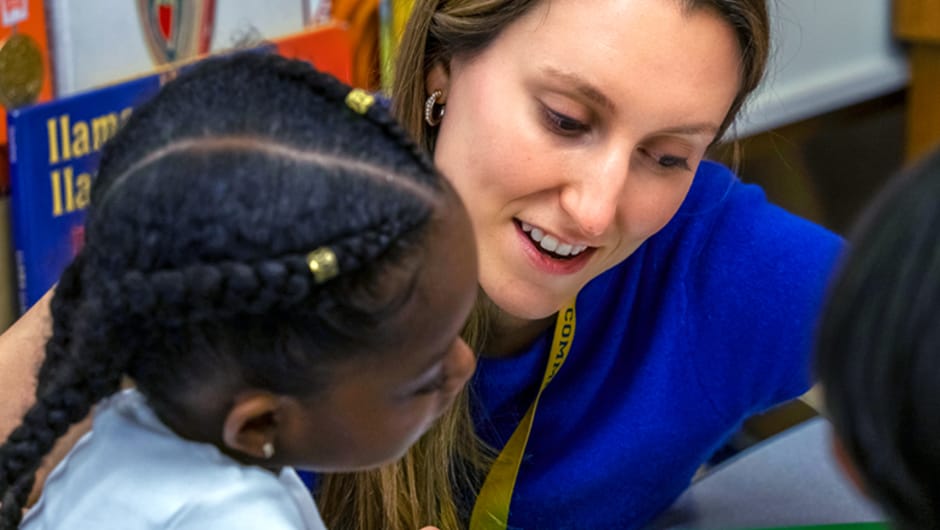
South Carolina Teacher of the Year Wants His Students to ‘Change and Shift the World’
Deion Jamison (South Carolina ’17) talks about the importance of empowering students and his aspirations to improve teacher retention in South Carolina.
“I always try to empower my students to think differently about the world,” said Deion Jamison, a high school English language arts teacher at Legacy Early College in Greenville, South Carolina.
As an educator of students who are just a few years away from graduating and entering the world as adults, Jamison (South Carolina ’17) knows his responsibility as a teacher goes beyond just imparting curricular materials.
“Whether that's them becoming more empathetic or them standing up for a cause that they believe in, I try to ensure that my students are walking away with real-world applicable knowledge that will make them better human beings who will make our society better,” Jamison said.
He joined the teaching profession to give students who look like him—and who grew up in underserved rural communities like he did—the skills they need to advocate for a greater world. This humanity-based, student-centered style of teaching shapes everything Jamison does in the classroom, whether he’s delivering a lesson about commas or “Romeo and Juliet.”
It’s an approach that has earned Jamison the title of Teacher of the Year—an especially momentous award because Jamison is the first Black male educator to be named Teacher of the Year in his home state of South Carolina. Jamison is one of two Teach For America alumni who were recognized as 2023 State Teachers of the Year: the other is Maryland pre-K teacher Berol Dewdney (Baltimore ’13).
Teach For America’s One Day spoke with Jamison to learn more about his evolution as an award-winning educator, how his time as a Teach For America corps member helped set him on his path of impact as a teacher, and what’s next for his career: finding ways to support teacher recruitment and retention in his state.
To start, I am curious to know how you learned that you won the 2023 State Teacher of the Year. Tell me about the moment when you received the big news.
In South Carolina, we have a Teacher of the Year gala that highlights all of our district teachers of the year and also the five finalists. When our state superintendent said my name I thought that I heard my name, but I was also in a state of shock because I was like, “Wait, what is going on?” So I sat there for a moment and she had to call my name twice for me to get up on the stage. I was just really excited, but also very shocked because I was up against some really strong teachers throughout our state. And so I was really excited, shocked, and incredibly humbled by being honored.
I would love to hear a little bit about your journey as an educator. Why were you inspired to join TFA? And how did your time as a corps member affect your decision to keep teaching and innovating in the classroom?
I knew as early as the fourth grade that I wanted to be a teacher. But when I was graduating from high school and going to college, I wanted—to be quite frank—to make a lot of money. And I knew that teachers were in an underpaid profession. So when I graduated and went to college, I started off in computer science and realized that I hated the coursework and it wasn't fulfilling to me.
There was a conversation that I had with a dormmate about our ACTs, and as we were comparing ACT scores, I remembered that when I was in high school, I scored a 21. I was celebrated for that because it was one of the highest scores that we had seen at our high school during that time. Whereas this guy that I was talking to said he made a score of 36, which I didn’t know was even possible.
And so I started to ask myself the question: what was the difference in terms of the quality of education and the opportunities that someone can receive in a more affluent area of South Carolina as opposed to a more rural and impoverished area, in which I grew up? Learning more about Teach For America's mission to eradicate educational inequity and provide opportunities to students in under-resourced areas was the driver for me to join TFA and ultimately become a teacher who stayed in the profession.
What is your approach to teaching? And how has that approach evolved over the years with more experience in the classroom?
I would say in my first two years of teaching, I was directly focused on results. I had tunnel vision on achieving high results with my students. And with that, I noticed that I wasn't necessarily building the relationships with my students and my families to get there, so I would become frustrated when I wouldn't receive the results that I was hoping for. I noticed that something was missing. I realized that I needed to look at my students as human beings as opposed to just students who should be receiving all the knowledge that I'm giving them. Right? And so I approach my work from a humanity-based perspective and with integrated culturally responsive methods to connect with my students and to build strong relationships with them, their families, and the community at large. This focus also allows students to see that they can change the world.
For example, I teach a unit entitled “Liberty and Justice For All” in which students analyze a multitude of literary and informational texts including the Declaration of Independence and the final essay by late civil rights activist Representative John Lewis. Students walk away with a belief that they have the ability to advocate on behalf of themselves and others. In the past, students have created graphics for a social media campaign advocating for a variety of causes including ending homelessness and police reform. Most recently, students have created podcast episodes through a collaboration with Soundtrap and Spotify to share their beliefs on what it will take for our nation to live up to its promise of “liberty and justice for all.” Students have gone on to join civic and leadership organizations at our school as a result of the work done in my classroom.
What role has mentorship played in your journey to becoming State Teacher of the Year?
This makes me think back to my support from Teach For America. I had really great coaches and we just have a really great staff in South Carolina that was very supportive. I had a really good coach during my first year of teaching; her name is Whitney Williams (Charlotte-Piedmont Triad ’12). She really stressed the importance of connecting with students to get that buy-in and to have them invested in their education.
And then there was Vanity Jenkins (Mississippi Delta ’10), former senior managing director of the South Carolina region. She just exuded all the qualities that I wanted to have as a teacher leader. She was responsive to the needs of her corps members while also holding a high standard for the corps members to achieve Teach For America’s goal that one day, all children will have an opportunity to attain an excellent education. For me, that means holding my students to a high and rigorous standard so that they can learn all that they need to learn to be successful after they've left my classroom. And so just modeling the example of those folks has led me to the point of being a State Teacher of the Year.
Get more articles like this delivered to your inbox.
The monthly ‘One Day Today’ newsletter features our top stories, delivered straight to your in-box.
Content is loading...
It’s no secret that teachers face significant challenges in 2023, including burnout, staff shortages, and low pay, among many other factors. How do you continue to stay motivated in the face of these challenges?
The reason why I went into education was to give students who look like me, and who come from underrepresented areas like I came from, the opportunities to change and shift the world. One day, they are going to be the ones setting the policy that runs our towns and our states and our nation. And so providing them with a high-quality education means that one day they'll be able to advocate on behalf of the profession. Hopefully, they remember that I was a really good teacher to them and those are the stories that they will carry with them as they become the leaders of our society. That is one of the things that motivates me, because I know that one day they are going to be the ones that, you know, hold that power.
What’s next? Are there any new initiatives that you are working on in service of your school or communities?
There's nothing set in stone as of this moment, but one of the things that I've spent my time focusing on is the recruitment and retention of teachers—mainly retaining teachers, especially teachers of color. I definitely want to work towards strengthening support programs in my district and throughout the state, partnering with and learning from the best practices from other districts from across the country to build strong retention programs and to offer that support to our early career educators.
Teacher retention is important so that we can retain talent in our schools and community, which in turn has a positive effect on student achievement. Having consistency in a teaching staff helps to build and strengthen school culture, which is important for both teacher and student success.
Finally, what words of advice or encouragement would you share with the educators reading this?
Always ensure that you're centering your students’ humanity in the stories you tell others. I’m always mindful of how I frame the stories that I tell about my students. I try to ensure that, one, I'm being honest and truthful, but also honoring their humanity and being hopeful about the experiences that I'm having in the classroom. And so leaning into the stories—whether positive or negative—is the thing that keeps me motivated, so that I can continue to advocate for effective change in education.
Read TFA One Day’s interview with TFA alumna and 2023 Maryland Teacher of the Year Berol Dewdney (Baltimore ’13).
We want to hear your opinions! To submit an idea for an Opinion piece or offer feedback on this story, visit our Suggestion Box.
Sign up to receive articles like this in your inbox!
Thanks for signing up!
Content is loading...






